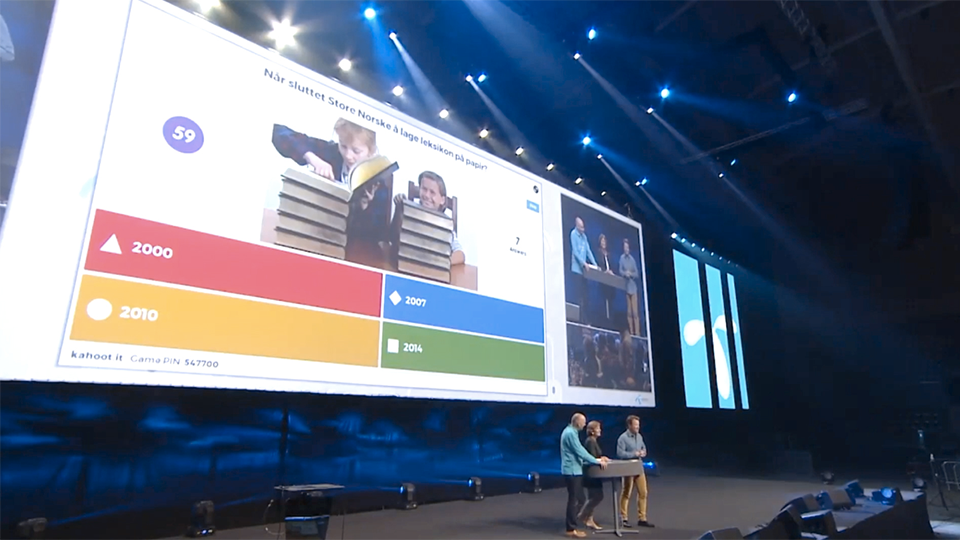96% of employees aim for TED-level speaking, only 4% succeed
A survey by Kahoot! shows a significant skills gap among professionals who present.
Kahoot! has unveiled insights from its workplace survey into the challenges professionals face delivering presentations. It reveals a significant gap among professionals who present: while 86% dream of having TED-level speaking skills, only 9% believe their own skills meet that level; 96% of respondents show interest in dedicated training; 90% feel unprepared for the TED stage - a reminder that mastering presentations is a significant challenge.
This desire for improvement is underscored by a recent Gallup survey, which found that only 1 in 3 employees felt engaged at work in 2023. Not surprisingly, the Kahoot! survey identified audience engagement as the primary challenge (53%) presenters face in workplace presentations, highlighting an opportunity to enhance communication strategies by incorporating aspects characteristic of TED talks.
Superstar Presenter Spotlight Survey insights:
Employers should strive for TED-like impact at work
While corporate professionals regard TED talks as the gold standard, only 9% currently consider themselves rockstar presenters. The survey identified storytelling (27%) and interactivity (25%) as the most sought-after speaker traits.
James Micklethwait, Vice President of Kahoot! at work, said, "We all love a good TED Talk, but translating that magic to the workplace is hard to replicate, especially in remote or hybrid settings. Our latest survey reveals that 96% of professionals are eager to enhance their presentation skills and that - in addition to storytelling - interactivity is an important and easily accessible way to maintain audience engagement throughout an entire presentation. This means that easy to use audience engagement technologies can help anyone become a superstar presenter without necessarily having the experience and skill of a TED speaker.”
The survey also showed that incorporating TED-style presentations into the workplace could foster a more positive and innovative culture, as nearly half (49%) of respondents believe that presentations inspired by TED would be motivational and deepen their knowledge at work. Forty-three percent of employees expressed anticipation rather than dread for these types of presentations, indicating a readiness to engage with this style. Notably, Gen Z showed the most enthusiasm compared to other generations.
At every level, there's a shared desire to master the art of "Speechcraft”
Regardless of position, the data reveals a significant presentation skills gap affecting professionals, even at the executive level. According to the survey, just 40% of C-suite respondents see themselves as "rockstar" presenters - despite the fact that half are presenting multiple times a week - yet many still want to fine-tune their presentation style, specifically when it comes to getting their message across clearly. It's no wonder 70% of them support advanced presentation training for their teams.
For the remaining staff, while 42% feel reasonably confident about their presentations, doubts remain about the effectiveness of their message. The survey showed that crafting a clear message (22%) and connecting with the audience (44%) is a key challenge for workplace presenters. Moreover, audience feedback is rare. Although 98% recognize its importance, only 13% receive it regularly. This disparity highlights the need for a more effective system to bridge the feedback gap.
Storytelling takes the spotlight as the MVP skill. However, it's interactivity that could steal the show
The survey revealed a demand for dedicated “super-presenter” skill-based training in the workplace, as 41% of professionals recognized its potential benefits. Among the generations, Millennials (45%) lead the way of those indicating a strong interest in "super-presenter" training, followed by 30% of Gen-X. Only 14% of Gen-Z and 11% of boomers expressed similar interest. The survey also identifies the top three attributes of a great presenter: storytelling (27%), the ability to create interactive sessions (25%), and a talent for injecting humor into presentations (16%). Interestingly, being a subject matter expert ranked lowest in importance at 15%.
According to Stanford lecturer, Think fast talk smart podcast host, and author of the book “Think faster, talk smarter”, Matt Abrahams, “Fostering engagement is critical, both to maintain the audience’s focus and enhance your ability to convey the relevance and importance of your topic. However, as confirmed by this survey, there's no silver bullet for achieving engagement; it can be cultivated through various means such as storytelling, interactive involvement (surveys, quizzes), humor, and more. While mastering the art of storytelling may pose challenges for many, actively involving your audience holds comparable power—and can be far more attainable.”


